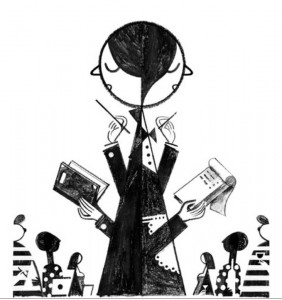Dear Commons Community,
Brittany Bronson, an adjunct English instructor at UNLV and a waitress at a chain restaurant, has an op-ed piece in today’s New York Times, describing her dual identities. Unlike some sad commentaries on the plight of adjunct faculty who struggle to make ends meet, Ms. Bronson finds benefits in being able to work as waitress as well as a professor.
“Indeed, for a young academic like myself, the job market is bleak. I’m pursuing advanced degrees and a career in the academy despite the lack of employment prospects, because my first and true love is learning. However, it will take earning a doctorate — and thus several more years of work — before I can earn a sustainable income in my chosen pursuit.
Living these two supposedly different lives, I’ve started to see their similarities. Whenever I’m trying to meet the needs of my more difficult guests (“Do you have any smaller forks?” “You don’t carry wheat bread? What kind of restaurant doesn’t carry wheat bread?”), I recite, along with my colleagues, the collective restaurant server mantra: “I need a real job.” The same thought gets passed among adjuncts in my department: “I need a real teaching position. I need to publish a book.”
She concludes:
“…not all my restaurant co-workers are college dropouts, and none are failures. Many have bachelor’s degrees; others have real estate licenses, freelancing projects or extraordinary musical and artistic abilities. Others are nontraditional students, having entered the work force before attending college and making the wise decision not to “find themselves” and come out with $40,000 in debt, at 4.6 percent interest. Most of them are parents who have bought homes, raised children and made financial investments off their modest incomes. They are some of the kindest, hardest-working people I know, and after three years alongside them, I find it difficult to tell my students to avoid being like them.
My perhaps naïve hope is that when I tell students I’m not only an academic, but a “survival” jobholder, I’ll make a dent in the artificial, inaccurate division society places between blue-collar work and “intelligent” work. We expect our teachers to teach us, not our servers, although in the current economy, these might be the same people.
If my students can imagine the possibility that choosing to work with their hands does not automatically exclude them from being people who critically examine the world around them, I will feel I’ve done something worthwhile, not only for those who will earn their degree, but for the majority who will not.”
What an inspiring outlook on life and people.
Tony


